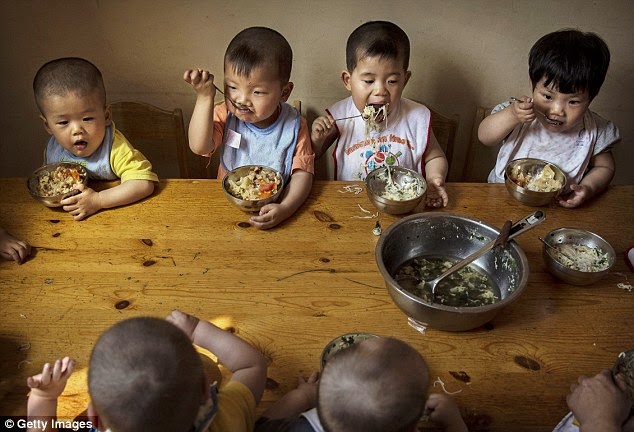These heartbreaking photos reveal the anguish of parents as they abandon their children in China's so-called 'baby hatches.'
The images taken at a centre in Guangzhou - one of 25 such hatch facilities in mainland China, spanning 10 provinces and major cities - show the last moments before parents give up their infants often due to poverty or an inability to cope with disease or disability.
Abandoning children is illegal in China, but the 'hatches' were introduced so parents could abandon infants safely rather than leaving them in the streets.
 |
| A woman holding her baby, who has Down's syndrome, crouches and cries between security guards and a family member in front of the Guangzhou baby hatch |
 |
| A mother weeps after leaving her child at the Guangzhou baby hatch, one of 25 such hatch facilities in mainland China, spanning 10 provinces and major cities |
But critics argue it encourages drastic action and believe some parents may feel it is more socially acceptable to abandon their children.
The hatch in opened in January, but staff were forced to shut the door just two months later after becoming overwhelmed with 262 abandoned youngsters - all of which were ill or disabled.
'My baby cannot take care of itself when it grows up. I just want my baby to survive,' said a mother reported the South China Morning Post.
In one of the photos an uncle is seen leaving his niece who he says is suffering from leukemia and her parents can not afford her medical bills.
Another distressing image shows a man crying after being told his baby is too old to be accepted.
A couple, whose child has Pierre Robin syndrome - congenital condition of facial abnormalities in humans - are also photographed walking to the centre to give up their child.
 |
| A man holding his baby cries in front of the Guangzhou baby hatch after the baby was refused because it is too old |
 |
| Residents visit an abandoned baby lying in a crib at the baby hatch in Guiyang, Guizhou province |
A parent typically opens a door and places their infant in a small room, rings a bell and leaves before welfare services collect the child.
Last month the welfare home's director Xu Jiu announced the suspension and told Xinhua news agency: 'I hope everyone understands the difficulties the welfare centre face.'
'We are temporarily closing the centre [to new babies] so that we can properly care for the infants already at the centre.'
 | ||
| A parent typically opens a door and places their infant in a small room, rings a bell and leaves before welfare services collect the child |
 | |
| A Chinese care worker carries a young orphaned girl at a foster care centre pictured today in Beijing, China |
 | |
| China says it has 576,000 orphans in its child welfare system though outside groups put the number at closer to a million |
 | |
| The parents who abandon them= children either cannot afford treatment or feel an inability to cope with raising a child who has special needs |
 | |
| A young Chinese orphaned boy crawls wearing corrective leg braces on the floor |
 | |
| Critics argue the centres encourage drastic action and believe some parents may feel it is more socially acceptable to abandon their children |
The centre, which also cares for orphans, has 1,000 beds.
Some 10,000 children were abandoned in China every year, said Wang Zhenyao, president of the China Welfare Research Institute at Beijing Normal University.
Media reports say many of these are girls and disabled children.
Abandonment has been encouraged by the one-child policy and a traditional bias for sons, who support elderly parents and continue the family name, leading to the abandonment of girls.
Even as China starts to relax the one-child policy, allowing millions of families to have a second child, it still penalises people who flout the rules.



No comments:
Post a Comment